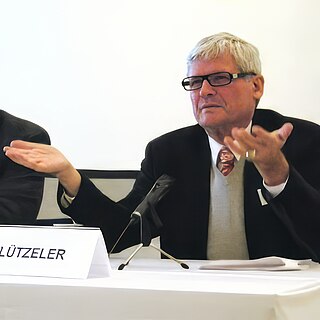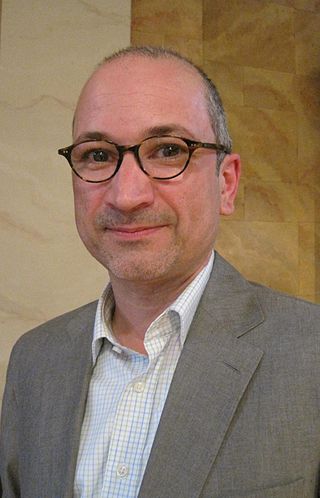
Winfried Georg Sebald, known as W. G. Sebald or Max Sebald, was a German writer and academic. At the time of his death at the age of 57, he was being cited by literary critics as one of the greatest living authors.
German studies is the field of humanities that researches, documents and disseminates German language and literature in both its historic and present forms. Academic departments of German studies often include classes on German culture, German history, and German politics in addition to the language and literature component. Common German names for the field are Germanistik, Deutsche Philologie, and Deutsche Sprachwissenschaft und Literaturwissenschaft. In English, the terms Germanistics or Germanics are sometimes used, but the subject is more often referred to as German studies, German language and literature, or German philology.
David E. Wellbery is an American professor of German Studies at the University of Chicago. As of 2022 he is the chair of the department of Germanic Studies and holds the LeRoy T. and Margaret Deffenbaugh Carlson University Professorship in the department. In 2020 he was elected to the American Philosophical Society.

Arnold Stadler is a German writer, essayist and translator.
Heinz Schlaffer is a Germanist and Professor of Literary Science of the University of Stuttgart. He is best known for essays like "Die kurze Geschichte der deutschen Literatur".
Anselm Haverkamp is a German-American professor of literature and philosophy.

Paul Michael Lutzeler is a German-American scholar of German studies and comparative literature. He teaches as Rosa May Distinguished University Professor Emeritus in the Humanities at Washington University in St. Louis.

Wolfgang Benz is a German historian from Ellwangen. He was the director of the Center for Research on Antisemitism of the Technische Universität Berlin between 1990 and 2011.

Vivian Liska, born in New York City, United States is a professor of German literature and director of the Institute of Jewish Studies at the University of Antwerp, Belgium. Since 2013 she is also distinguished visiting professor at Hebrew University, Jerusalem.

Alfred Grosser is a German-French writer, sociologist, and political scientist. He is known for his contributions towards the Franco-German cooperation after World War II and for criticizing Israel.

Mark. H. Gelber is an American-Israeli scholar of comparative literature and German-Jewish literature and culture. He received his B.A. magna cum laude and with high honors in Letters and German. He also studied at the University of Bonn, the University of Grenoble, and Tel Aviv University. He was accepted for graduate studies as a Lewis Farmington Fellow in the Humanities and Social Sciences at Yale University and he received his M.A., M.Phil., and Ph.D. from Yale University. In 1980 he accepted an appointment as post-doctoral lecturer at Ben-Gurion University of the Negev, Beer Sheva, in the Department of Foreign Literatures and Linguistics. Except for guest professorships and research fellowships abroad, he has been affiliated there since that time. His research topics include: German-Jewish literature and culture, the literature of exile, cultural Zionism, early Zionist literature and journalism, literary anti-Semitism, autobiography and biography, and literary reception. He lectures frequently at international meetings and conferences in Israel, Europe, China, and the United States. He is presently professor emeritus with active researcher status.
Ottmar Ette is Professor of Romance languages and Comparative literature at University of Potsdam.

Aleida Assmann is a German professor of English and Literary Studies, who studied Egyptology and whose work has focused on cultural anthropology and Cultural and Communicative Memory.

Peter-André Alt is a German literary scholar, former president of the Freie Universitaet of Berlin and, since August 2018, president of the German Rectors' Conference (HRK). Alt is married to the writer Sabine Alt and has two adult sons.

Steffen Martus is a German literary scholar and Professor of Modern German Literature at Humboldt University in Berlin.
The "Jewish parasite" is a notion that dates back to the Age of Enlightenment. It is based on the idea that the Jews of the diaspora are incapable of forming their own states and would therefore parasitically attack and exploit states and peoples, which are biologically imagined as organisms or "peoples bodies". The stereotype is often associated with the accusation of usury and the separation of "creative", i.e. productive, and "raffling", non-productive financial capital.
Martina Wagner-Egelhaaf is a Professor of German Literature at the University of Münster, Germany, and holds a chair in German Literary History with special focus on Modernity and Contemporary Literature. Her fields of research include Autobiography/Autofiction, Literary Theory, Rhetoric, Literary and Cultural Studies, Gender Studies, the relation of Religion, Politics and Literature as well as Law and Literature.
Peter Uwe Hohendahl is a literary and intellectual historian and theorist. He served as the Jacob Gould Schurman Professor of German Studies at Cornell University, where he is now a professor emeritus.
Die Grenzboten was a German language, national liberal magazine published from 1841 to 1922, sometimes weekly and sometimes fortnightly.
Liliane Weissberg is an American literary scholar and cultural historian specializing in German-Jewish studies and German and American literature. She is currently the Christopher H. Browne Distinguished Professor in Arts and Sciences and Professor of German and Comparative Literature at the University of Pennsylvania. She received, among others, a Guggenheim Fellowship, the Humboldt Research Award for her research on German-Jewish literature and culture and the Berlin Prize of the American Academy in Berlin, and holds an honorary degree from the University of Graz.










